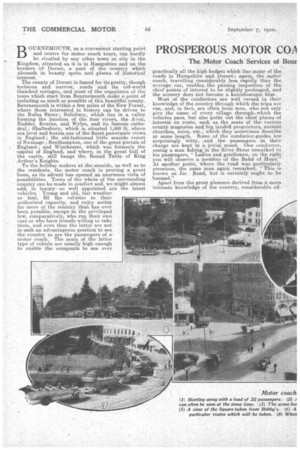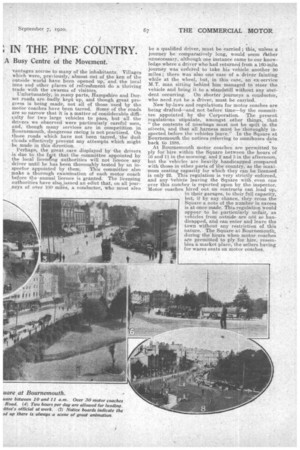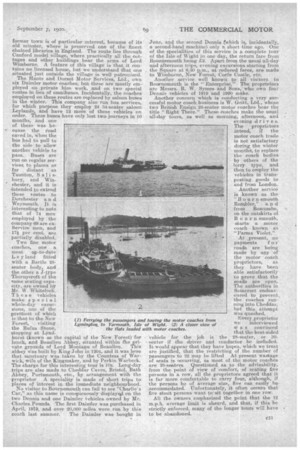PROSPEROUS MOTOR . COA IN THE PINE COUNTRY.
Page 10

Page 11

Page 12

Page 13

If you've noticed an error in this article please click here to report it so we can fix it.
The Motor Coach' Services of Bour
A Busy Centre of the Movement. , OURNEMOUTH, as aconvenient starting point and centre for motor coach tours, can hardly ". be rivalled by any other town or city in the Kingdom, situated as it is.in Hampshire and on the borders of, Dorset, a part of the country which abounds •in beauty spots and places of ,historical interest.
The county of Dorset is famed for its pretty, though tortuous and narrow, roads and its old-world thatched cottages, and most of the organizers of the tours which start from Bournemouth make a point of including as much as possible of this beautiful county. Bournemouth is within a few miles of the New Forest, where those interested, in history can be driven to the Rufus Stone ; Salisbury, which lies in a valley forming the junction of the four rivers, the Avon, Nadder, Bourne, and Wylye, and its famous cathedral ; Shaftesbury, which is situated 1,000 ft. above sea level and boasts one of the finest panoramic views in England ; the old-fashioned little seaside resort of Swanage ; Southampton, one of the great portals of ,England; and Winchester, which was formerly the capital of England, and where, in the great hall of the castle, still hangs the Round Table of King Arthur's Knights. To the holiday makers at theseaside, as well as to the residents, the motor coach is proving a great boon, as its advent has opened an enormous vista of possibilities. Tours of the whole of the surrounding country can be made in comfort and, we might almost add, in luxury—so well appointed are the latest
vehicles. Young and old, fair weather or foul, fill the vehicles to their authorized capacity, and enjoy seeing far more of the country than has ever been possible, except to the privileged few, comparatively, who run their own cars or who have friends willing to take them, and even then the.latter are not in such an advantageous position to see the country as are the passengers of a motor coach. The seats of the latter type of vehicle are usually high enough to enable the occupants to see over practically all the high hedge' S which line many of the roads in Hampshire and Dorset ; again, the motor coach, travelling considerably less rapidly than the average ear, enables the passing inspection of the chief points of interest to be slightly prolonged, and the scenery does not become a kaleidoscopic blur.
Most of the conductors are well versed, in their . knowledge of the country through which the trips are run, and, in tact, are often local men, who not only give the name of every village through.which the vehicles pass, but also point out the chief places of interest en route, such as the seats of the various county magnates and big landed proprietors, ancient churches, ruins etc., which they sometimes describe at some length. Some of the conductor-guides are surprisingly witty, and the passengers in their. charge are kept In a jovial mood. One conductor, seeing a man lishing.in the River Stour remarked to his passengers, "Ladies and gentlemen, on the right you will observe a member of the Band of Hope." At another point, where the road was particularly atrocious, the same man .again remarked, " This iiknown as Jar. Road, but it certainly ought to be banned."
Apart from the great pleasure derived from a more intimate knowledge of the country, considerable ad vantages accrue to many of the inhabitants. Villages which were, previously, almost out of the ken of the outsideworld have been opened up, and the local inns and other places of refreshment do a thriving trade' with the swarms of visitors.
Unfortunately, in many parts, Hampshire and Dorset roads are badly kept up, and though great progress is being made, not all of those used by the motor coaches have been tarred. Some of the roads are so narrow that it is a, matter of considerable difficulty for, two large vehicles to pass, but all the drivers we observed were particularly careful men, and, though many services are in competition in Bournemouth, dangerous racing is not practised. On those roads which have not been tarred, 'the dust clouds effectively prevent any attempts which might be made in this direction.
Perhaps, the great care displayed by the drivers is due to the fapt that the committee appointed by the localliceneing authorities will not licence any driver until he has been thoroughly tested by an inspector appointed by them. This committee also make a thorough examination of each motor coach before the annual licence is granted. The licensing authorities have alscLissued an edict that, on all journeys of over 100' miles, a conductor, who must also
be a qualified driver, must be carried ; this, unless a journey be comparatively long, would seem rikther unnecessary, although one instance came to our knowledge where a driver who had returned froth a 160-mite journey was ordered to take his vehicle another 50 miles; there was also one case of a driver fainting while at the wheel, but, in this case, an ex-service M.T. man sitting behind him managed to steer the vehicle and bring it to a standstill without any atcl
dent occurring. Ott shorter journeys a conductor, who need not be a driver, must be carried.
New by-laws and regulations for motor coaches -are being drafted—and not before time—by the committee appointed by the Corporation. The present regulations stipulate, amongst other things,. that "the contents of nosebags must not be spilt In. the stioets, and that all harness must be thoroughly inspected before the vehieles leave." In the Square at Bournemouth the notices referring to omnibuses date back to 1888.
At Bournemouth motor coaches are permitted to ply for hire within the Square between the hours of 10 and 11 in the morning, and 2 and 3 in the afternoon, but the vehicles are heavily handicapped compared with those in other parts of the country, as the maximum seating capacity for which they can be licensed is only 22. This regulation is very strictly enforced, and any Irehiele leaving the Square with even one over this number is reported upon by the inspector. Motor coaches hired out on contracts' can load up, in their garages, to their full capacity, but, if by any chance, they cross the Square a note of the number in excess is at once made. This regulation would appear to be .partioularly unfair, as vehicles from outside are nOt so handicapped, and can enter and leave the town without any restriction of this nature. The Square at Bournemouth, during the hours when motor coaches are permitted to ply for hire, resembles a market place, the sellers having for wares seats on motor coaches. Approximately, 60 motor coaches are owned and ply for hire in Bournemouth, and on certain days, particularly Wednesdays and Saturdays, as many as 90 others arrive in the town from outside. Practically all the services have offices in the Square, where , seats can be booked, whilst many, in addition, have agents in other parts of the town. The largest fleet is known as " The Royal Blue," and is run by Elliott Bros. Their fleet consists of some 32 vehicles. Twenty-six of theee machines are Daimlers; the rest are of A.E.C. manufacture. Sixteen coaches . are 28, twelve 22, and four 18-seaters. The con: corn is a most enterprising one, and tours are run to practically every . place of interest in the neighbourhood, as well as to others • further *afield. A regular express service between Brighton and London has recently been opened, motor coaches .leaving Brighton every _Friday and Monday at 10 a.m., and leaving London every Saturday and Tuesday at the same time. The single fare is 20s. and the return fare 30s.
Special whole day and afternoon excursions are arranged each week. As an example of these, one starts from Bournemouth at 10.30 a.m., visits Salisbury Cathe
• dral, and returns to Bournemouth. at 6 p.m., the fare being 8s. r,(1. Another to Cheddar Caves and Wells Cathedral is priced at 17s. 6d. One of the prettiest drives is that to Swanage and Code Castle, although, unfortunately, the roads are in rather bad condition. Code Castle, of which little now remains, is situated on a steep hill, and can be seen for many miles. Its history can be traced back as far as the year 978,when Edward, King of the West Saxons, was murdered there by his mother-inda,w, Elfrida. The return fare for this trip, of approximately 50 miles, is only7.s.• -641. Elliott Bros.. also act as agents for Thomas Cook and Sons, for whom they conduct their Devon and Cornwall tours as well-as the .18-day -Ours to the Scottieh lakes.
One interesting tour is that to the Isle of Wight. The coach starts from 'Bournemouth at 7 a.m., and the route is via Lymington, Yarmouth, where a stop c10 is made for breakfast, Freshwater Bay, Ventnor, and thence on to Shanklin, past Ryde Pier, and thence to Osborne House and the Naval Cadets' School, through East and West Cowes to Carisbrooke Castle, returning to Bournemouth by 7.30 p.m. The vehicles are ferried over to the Isle of Wight in large barges known as flats, each af which will hold two coaches.
For those of a romantic temperament, permanent or temporary, there are moonlight runs in the New Forest, -as well as to other beauty spots in the neighbourhood. The fare to the New Forest
and Burley is 4s. '
Another very popular service is the .` White Heather," run by Mr. Mark Briant. This comprises six motor coaches of two makes—A.E.C. and Daimler, all being 28-seaters. Mr. Briant was one of the first local people to start motor coaches, his first ma chine being a. Lacre 36-seater, which was put into service in 1912. This was foltowed by a Dennis. and then by -a Daimler, but all these vehicles were • impressed when war brake out. Whilst passing a row of " White Heather" motor coaches, we noticed a lady stepping out -of a fine Daimler landaulet and into a coach; on making inquiries we learnt that, with commendable enterprise, Mr. Briant arranges for those perams who have booked seats in advance in the coaches to be brought from their places of residence to the starting points of the coaches by private cars. During the last railway ' strike, this proprietor ran motor coaches daily to London, the Midlands, and South Wales, and on one occasion he undertook the conveyance of the Bourne.mouth Municipal Orchestra to Pontypridd. Apart from the usual trips to beauty spots in the immediate neighbourhood of Bournemouth, "White Heather": ;coaches *make special ,Sunday tours. to' Taunton via Sherborne, Yeovil and Ilminster, allowing:the passengers a Stop at Taunton of three hours' duration. This trip totals 160 miles, and the return fare is 10s. 6d. Another coach leaves the. Square at 2.30 071 Sunday for Salisbury, allowing three. hours in this interesting city, at a fare of 3s. return. Daily services are run to Wimborne, Weymouth, etc.., .The
• a day's trip. (2) square and prints Tea at Fordingen route. former town is of particular interest, because of its old minster, where is preserved one Of the finest chained libraries in England. The route lies through Canford model village, where practically all the cottages and other buildings bear the arms of Lord Wimborne. A feature of this village is that it contains no licensed house, but we understand that one situated just outside the village is well patronized.
The Hants and Dorset Motor Services, Ltd., own six Daimler motor coaches, but these are mostly employed on private hire work, and on two special routes. in lieu of omnibuses. Incidentally, the coaches employed on these routes are replaced by saloon buses in the winter. This company also run bus services, for which purpose they employ 24 34-seater saloon Leylands and have 12 more of these vehicles on order. These buses have only lost two journeys in 41 months, and one of theSe was because the road caved in, When the bus had to. pull to the side to allow another vehicle to pass. Buses are run on regular services, to places as far distant as Taunton, Salisbury, and Winchester, and it is -intended to extend these routes to Dorchester an d Weymouth.. It is ' interesting to note that of 74 men employed by the company 69 are exService men, and 11 per cent. are partially disabled.
Two fine motor coaches, one a most up-to-date y land fitted with a Bartle 28seater body, and the other a 3-type Thornycroft of the same seating capacity, are owned by Mr. W. Whitelock. T Ii e a e vehicles make special whole-day excursions, one of the prettiest of which is that to the New
Forest, visiting the Rufus Stone, stopping at Lyndhurst (known as the capital of the New Forest) for lunch, and Beaulieu Abbey, situated Within the private grounds of Lord Montagu of Beaulieu. This abbey Was built by King John in 1204, and it was here that sanctuary was taken by the Countess of Warwick, wife of the Kingmaker, and by Perkin Warbeek. The charge for this interesting tour is 10s. Long-daytrips are also made to Cheddar Caves, Bristol, Bath Abbey, Portsmouth, etc., by arrangement with the proprietor A speciality is made of short trips to places of interest in. the immediate neighbourhood. No visitor to Bournemouth can fail to see "Charlie's Car," as this name is conspicuouslydisplayegl an the two Dennis and one Daimler Vehicles owned by Mr. Charles Pounds. The first Daimler was purchased in April, 1919, and over 20,000 miles were run by this coach last summer. The Daimler was bought in •
• June, and the second Dennis (which is, incidentally, a second-hand machine) only a short time ago. One of the specialities of this service is a complete tour of the Isle of Wight in one day, the return fare from Bournemouth being R2. Apart from the Usual and afternoon trips, evening excursions starting from the Square at 6.30 p.m., at reduced fares, are made to Wimborne, New Forest, Carle Castle, etc.
Another service well known to all visitors to Bournemouth is the "Enterprise.' The proprietors are Messrs. R. W. Symes and Sons, who own four Dennis vehicles of 1919 and 1920 make.
Another concern which is conducting a very suc
cessful motor poach business is. W. Gritt, Ltd. whose two British Ensign. 28-seater motor coaches bear the title "Right There." These coaches make the us.ual all-day tours, as well as morning, afternoon, and
evening drive s.
The proprietors intend, if the motor coach trade is not satisfactory during, the winter months, to replace the coach bodies by others of the lorry type, and then to employ the vehicles in transporting goods to and from London.
Another service
is known as the "Be urn emouth Rambler," a p d from BoscOmbe, on the outskirts of Bourn emouth, starts a motor coach known as "Parma Violet." At _present, no
payments f o r roads are being made by any of' the motor coach
proprietors, as they have been -able satisfactorily to prove that the roads are open. The authorities in Somerset endeavoured to prevent, the coaches running into Cheddar, but this, attempt was quashed.
Ever,y,proprietor we interviewed .1,Y. a a convinced that the best,sided
vehicle for the job is the 28-seater, or 30seater if the driver and conductor be included. It would appear that they have hopes, which we trust are justified, that the restricting of the number of passengers to 22 may be lifted At present wastage of seats is occurring, as most of the motor coaches are 28-seaters Questioned as to the advisability, from the point of view of comfort, of seating five persons in a row, all the proprietors agreed that it is far more comfortable to carry four, although, if the persons be of average size, five can easily be accommodated. Unfortunately, it often occurs that five stout persons want to sit together in one row.
All the owners, emphasized the point that the 12 m.p.h. average limit is absurd, and that, if this be strictly enforced, many of the longer tours will have to be abandoned.




























